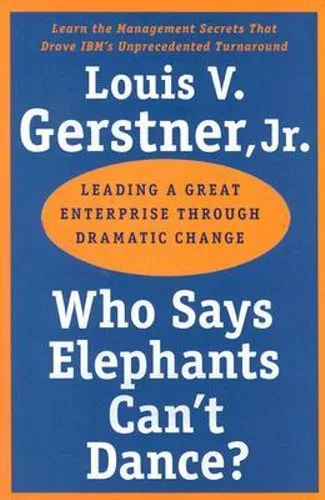Who Says Elephants Can't Dance: Inside IBM's Historic Turnaround
 by Louis V. Gerstner Jr.
by Louis V. Gerstner Jr. Some good leadership lessons from a CEO who rescued IBM from the brink of failure.
If an executive demonstrates that exceptions are part of the game, then his or her leadership will erode as the trust of colleagues evaporates. Cultures in which it is easier to ask forgiveness than permission disintegrate over time. Leaders who don’t demand uniform and fair adherence to good principles and policies lose their effectiveness.
Too often the executive does not understand that people do what you inspect, not what you expect.
Rarely do great companies have a proprietary position that insulates them from the constant hand-to-hand combat of competition.
If a company hears about an attractive acquisition candidate first from an investment banker, it almost always means the company hasn’t done a good job on its strategy.
Vision statements are for the most part aspirational, and they play a role in creating commitment and excitement among an institution’s employees. But in and of themselves they are useless in terms of pointing out how the institution is going to turn an aspirational goal into a reality.
History shows that truly great and successful companies go through constant and sometimes difficult self-renewal of the base business. They don’t jump into new pools where they have no sense of the depth or temperature of the water.
No company is a success, financially or otherwise, without satisfied customers.
Our primary measures of success are customer satisfaction and shareholder value.
Decisions need to be made by leaders who understand the key drivers of success in the enterprise and then apply those principles to a given situation with practical wisdom, skill, and a sense of relevancy to the current environment.
I wanted people to focus on customers and the marketplace, not on internal status.
Bonuses were paid to executives based solely on the performance of their individual units. In other words, if your operation did well but the overall corporation did poorly, it didn’t matter. You still got a good bonus. This encouraged a me-centered culture
You can’t transform institutions if the incentive programs are not aligned with your new strategy.
Executives at IBM were not going to be granted stock options unless they concurrently put their own money into direct ownership of company stock. We established guidelines that effectively said: “You have to have some skin in the game.” No free ride.
We made stock-based compensation the largest element of executives’ pay, downplaying annual cash compensation relative to stock appreciation potential. This is part of my management philosophy. Executives should know they don’t accumulate wealth unless the long-term shareholders do the same.
Differentiate our overall pay based on the marketplace; differentiate our increases based on individual performance and pay in the marketplace; differentiate our bonuses based on business performance and individual contributions; and differentiate our stock-option awards based on the critical skills of the individual and our risk of loss to competition.
The sine qua non of any successful corporate transformation is public acknowledgment of the existence of a crisis. If employees do not believe a crisis exists, they will not make the sacrifices that are necessary to change.